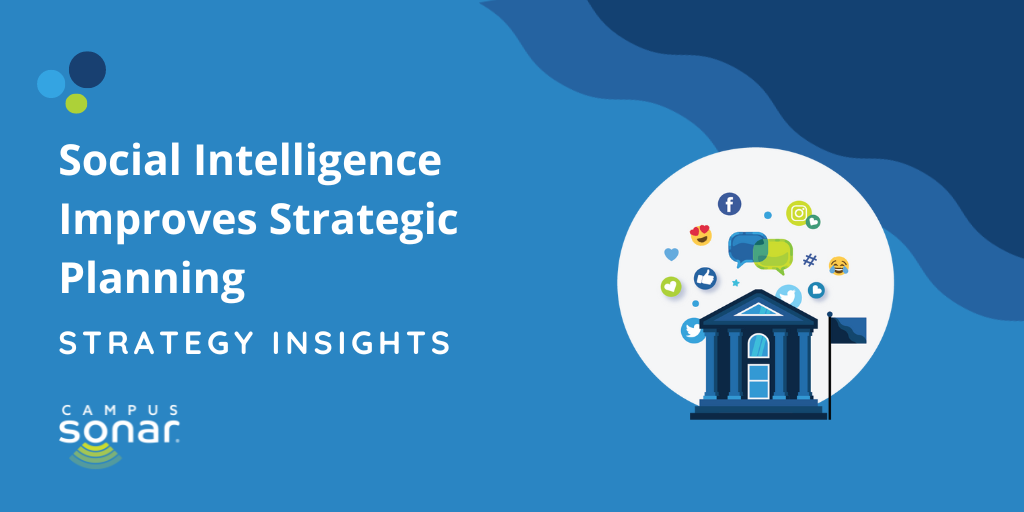Social intelligence improves strategic planning

As an industry, higher ed is often slow to change. But in the current landscape, change is critical to long-term sustainability. A strong strategic plan gives you flexibility to evolve as needed to meet current market and audience needs.
Strategic plans start with an environmental scan to understand the current status of your institution in the marketplace, as well as opportunities or threats you need to address in the plan. Data is often gathered through surveys or focus groups, which rely on assumptions about audiences and can often be unintentionally exclusionary.
Social intelligence is a better method for environmental scanning. It leverages organic online conversation and is faster, more fluid, and more authentic than traditional focus groups, interviews, surveys, or audience panels.
An Informed Strategic Plan
Social intelligence improves the value of environmental scans so your campus maintains relevance and evolves with your audiences’ needs. It offers insights into a community's experiences and beliefs, so you understand audiences, markets, and brands and develop authentic and relevant strategies.
Through seven years of partnering with more than 100 higher education clients, we’ve developed a process to enhance strategic decision making by uncovering stakeholder voices and market trends through social intelligence.
Envision
We start with generating buy-in by defining the process, purpose, participants, and decision-making procedures. We also gather foundational information from your mission, vision, values, etc., so we have a clear understanding of where your campus is now and what you want to learn. We build a social listening query designed specifically to uncover the answers to your questions.
Engage to Inform Your Plan
We gather and analyze online conversation and news media mentions from a historical period relevant to your planning process to gather actionable insights that meet key planning objectives.
Listen to what your audiences care about and believe about your campus so you understand your current brand positioning and strengths. This includes measuring key performance indicators such as brand awareness, messaging, strengths, and audience feedback to help you understand your progress and change adoption.
In our work with the University of Arkansas-Fort Smith (UAFS), they gained insights from listening to online conversation that supported strategic decisions. They identified a goal to become an HSI and included support for student access, engagement, and success in their strategic plan. Through our social intelligence work, the team learned that a Spanish-speaking admissions event had a rich social conversation that influenced their audience’s perception of the event—and wasn’t apparent from traditional on-site surveys. The insights prompted them to meet their Spanish-speaking audience where they were and infuse social into the marketing to emphasize the in-person intention of the event. It also allowed them to answer meaningful questions for students and their families, and completely changed how the team viewed their Hispanic recruitment efforts.
Conduct market and competitor assessments to understand market demand, your offerings, competitors, and how you compare. Learn the narrative and demand for programs you’re considering, and which programs your most important audiences care about. Determine your top competitors and how they compare your campus to theirs.
Assess your campus’s fiscal and market positions versus where you want to be, synthesizing the inputs and collected data. Identify critical priorities that will sustain you in the short and long term, and consider how to develop your strategic plan to align with campus priorities, brand strengths and attributes, market position, and unique differentiators.
UAFS also uses social intelligence to understand online conversation through the lens of the strategic plan focus areas. They’re committed to support regional industry and grow the regional economy. As part of the strategic goal, they’re tasked with finding businesses that use the UAFS Center for Economic Development and Small Business and Technology Development Center to upskill their workforce. Social intelligence supports their efforts to find the gifts and investments that support UAFS’s commitment to this priority. They’re proactively seeking ways to highlight the long-term impacts in their curriculum and programming, such as through current student achievements or faculty research.
Social Intelligence Value
- Promises authenticity from the large volume of ongoing feedback and unfiltered insights that are shared unprompted.
- Includes all stakeholders, especially those who may not participate in traditional research.
- Highlights the unique voices of underrepresented or historically marginalized groups.
Create, Optimize, and Calibrate
Based on the social intelligence gathered and other campus data sources, you create a strategic plan and define how you’ll invest resources and align them across campus to achieve your goals. We support your ongoing efforts to measure and monitor progress and change adoption during and after implementing your strategic plan, leveraging social intelligence. Our actionable insights give you confidence to adjust the action plan as needed to support continuous improvement and achieve desired results.
Social Intelligence Value
Use social intelligence to optimize your plan and measure the effectiveness of your work, monitoring:
- Your online brand presence over time
- How your audiences consider your campus compared to others
- The narrative around prominent areas of study changes
- New risks, challenges, or opportunities that emerge
Inform and Assess Your Strategic Plan with Social Intelligence
Campus Sonar customizes each client partnership to meet your needs and timeline. To discuss how social intelligence can inform your strategic plan, schedule a time to meet with our founder and CEO, Liz Gross. If you’re not yet ready for a conversation, download the Transform Your Strategic Plan handout to share with your colleagues.

